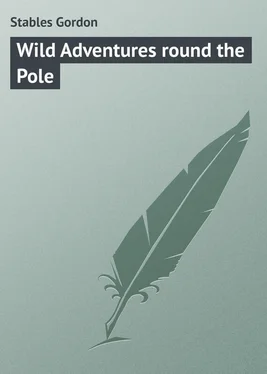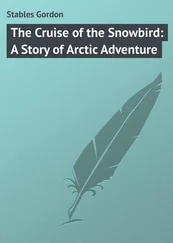Gordon Stables - Wild Adventures round the Pole
Здесь есть возможность читать онлайн «Gordon Stables - Wild Adventures round the Pole» — ознакомительный отрывок электронной книги совершенно бесплатно, а после прочтения отрывка купить полную версию. В некоторых случаях можно слушать аудио, скачать через торрент в формате fb2 и присутствует краткое содержание. Жанр: foreign_prose, foreign_children, на английском языке. Описание произведения, (предисловие) а так же отзывы посетителей доступны на портале библиотеки ЛибКат.
- Название:Wild Adventures round the Pole
- Автор:
- Жанр:
- Год:неизвестен
- ISBN:нет данных
- Рейтинг книги:3 / 5. Голосов: 1
-
Избранное:Добавить в избранное
- Отзывы:
-
Ваша оценка:
- 60
- 1
- 2
- 3
- 4
- 5
Wild Adventures round the Pole: краткое содержание, описание и аннотация
Предлагаем к чтению аннотацию, описание, краткое содержание или предисловие (зависит от того, что написал сам автор книги «Wild Adventures round the Pole»). Если вы не нашли необходимую информацию о книге — напишите в комментариях, мы постараемся отыскать её.
Wild Adventures round the Pole — читать онлайн ознакомительный отрывок
Ниже представлен текст книги, разбитый по страницам. Система сохранения места последней прочитанной страницы, позволяет с удобством читать онлайн бесплатно книгу «Wild Adventures round the Pole», без необходимости каждый раз заново искать на чём Вы остановились. Поставьте закладку, и сможете в любой момент перейти на страницу, на которой закончили чтение.
Интервал:
Закладка:
But disagreeable as the sensation is of lying lifeless in harbour or dock, still more so is it to feel your vessel, that one moment before was sailing peacefully over the sea, suddenly rasp on a rock beneath you, then stop dead. Nothing in the world will wake a sailor sooner, even should he be in the deepest of slumber, than this sudden cessation of motion. I remember on one particular occasion being awakened thus. No crew ever went to sleep with a greater feeling of security than we had done, for the night was fine and the ship went well. But all at once, about four bells in the middle watch, —
Kurr-r-r-r! that was the noise we heard proceeding from our keel, then all was steady, all was still. And every man sprang from his hammock, every officer from his cot.
We were in the middle of the Indian Ocean, or rather the Mozambique Channel, with no land in sight, and we were hard and fast on the dreaded Lyra reef. A beautiful night it was, just enough wind to make a ripple on the water for the broad moon’s beams to dance in, a cloudless sky, and countless stars. We took all this in at the first glance. Safe enough we were – for the time; but if the wind rose there was the certainty of our being broken up, even as the war-ship Lyra was, that gave its name to the reef.
At the first shout from the man on the outlook in the Arrandoon , McBain rushed on deck. “Stand by both anchors. Ready about.” But these orders are, alas! too late. Kurr-r-r-r! The stately Arrandoon is hard and fast on the rocky bottom.
The ship was under easy sail, for although there was hardly any wind, what little there was gave evident signs of shifting. It might come on to blow, and blow pretty hard, too, from the south-east or east-south-east, and Mr Stevenson was hardly the man to be caught in a trap, to find himself on a lee shore or a rock-bound coast, with a crowd of canvas. Well for our people it was that there was but little sail on her and little wind, or, speedily as everything was let go, the masts – some of them at least – would have gone by the board.
Half an hour after she struck, the Arrandoon was under bare poles and steam was up.
The order had been given to get up steam with all speed. Both the engineer and his two assistants were brawny Scots.
“Man!” said the former, “it’ll take ye a whole hour to get up steam if you bother wi’ coals and cinders alone. But do your best wi’ what ye hae till I come back.”
He wasn’t gone long ere he came staggering down the ladder again, carrying a sack.
“It’s American hams,” he said; “they’re hardly fit for anything else but fuel, so here goes.”
And he popped a couple into the fire.
“That’s the style,” he said, as they began to frizzle and blaze. “Look, lads, the kettle’ll be boilin’ in twa seconds.”
“Thank you, Stuart,” said McBain, when the engineer went on the bridge to report everything ready; “you are a valuable servant; now stand by to receive orders.”
All hands had been called, and there was certainly plenty for them to do.
It wanted several hours to high-water, and McBain determined to make the best of his time.
“By the blessing of Providence on our own exertions, Stevenson,” the captain said, “we’ll get her off all right. Had it been high-water, though, when we ran on shore, eh!”
Stevenson laughed a grim laugh. “We’d leave her bones here,” he said, “that would be all.”
The men were now getting their big guns over the side into the boats. This would lighten her a little. But as the tide was flowing, anchors were sent out astern, to prevent the ship from being carried still farther on to the reef.
“Go astern at full speed.”
The screws revolved and kept on revolving, the ship still stuck fast. The night was very dark, so that everything had to be done by the weird light of lanterns. Never mind, the work went cheerily on, and the men sang as they laboured.
“High-water about half-past two, isn’t it, Stevenson?” asked Captain McBain.
“Yes, sir,” the mate replied, “that’s about the time, sir.”
“Ah! well,” the captain said, “she is sure to float then, and there are no signs of your storm coming.”
“There is hardly a breath of wind now, sir, but you never know in these latitudes where it may come on to blow from next.”
The cheerful way in which McBain talked reassured our heroes, and towards eleven o’clock English Ralph spoke as follows, —
“Look here, boys – ”
“There isn’t a bit of good looking in the dark, is there?” said Allan.
“Well,” continued Ralph, “figuratively speaking, look here; I don’t see the good of sticking up on deck in the cold. We’re not doing an atom of good; let us go below and finish our supper.”
“Right,” said Allan; “and mind you, that poor girl is below there all this time. She may want some refreshment.”
When they entered the saloon they found it empty, deserted as far as human beings were concerned. Polly the cockatoo was there, no one else.
“Well?” said the bird, inquiringly, as she helped herself to an enormous mouthful of hemp-seed. “Well?”
“What have you done with the young lady?” asked Allan.
“The proof o’ the pudding – ”
Polly was too busy eating to say more. Peter the steward entered just then, overhearing the question as he came.
“That strange girl, sir,” he replied, “went over the side and away in her boat as soon as the ship struck.”
“Well, I call that a pity,” said Allan; “the poor girl comes here to warn us of danger and never stops for thanks. It is wonderful.”
“From this date,” remarked Ralph, “I cease to wonder at anything. Steward, you know we were only half done with supper, and we’re all as hungry as hunters, and – ”
But Peter was off, and in a few minutes our boys were supping as quietly and contentedly as if they had been in the Coffee-room of the Queen’s Hotel, Glasgow, instead of being on a lee shore, with the certainty that if it came on to blow not a timber of the good ship Arrandoon that would not be smashed into matchwood.
But hark! the noise on deck recommences, the men are heaving on the winch, the engines are once more at work, and the great screw is revolving. Then there is a shout from the men forward.
“She moves!”
“Hurrah! then, boys, hurrah!” cried McBain; “heave, and she goes.”
(The word “hurrah” in the parlance of North Sea sailors means “do your utmost” or “make all speed.”)
The men burst into song – tune a wild, uncouth sailor’s melody, words extempore, one man singing one line, another metreing it with a second, with a chorus between each line, in which all joined, with all their strength of voice to the tune, with all the power of their brawny muscles to the winch. Mere doggerel, but it did the turn better, perhaps, than more refined music would have done.
In San Domingo I was born,
Chorus – Hurrah! lads, hurrah!
And reared among the yellow corn.
Heave, boys, and away we go.
Our bold McBain is a captain nice,
Chorus – Hurrah! lads, hurrah!
The main-brace he is sure to splice.
Heave, boys, and away we go.
The Faroe Isles are not our goal,
Oh! no, lads, no!
We’ll reach the North, and we’ll bag the Pole,
Heave, boys, and away we go,
Hurrah!
“We’re off,” cried Stevenson, excitedly. “Hurrah! men. Hurrah! hurrah! hurrah!”
The men needed but little encouragement now, though. Round went the winch right merrily, and in a quarter of an hour the bows were abreast of the anchors.
“Now, steward,” said the captain, “splice the main-brace.”
Читать дальшеИнтервал:
Закладка:
Похожие книги на «Wild Adventures round the Pole»
Представляем Вашему вниманию похожие книги на «Wild Adventures round the Pole» списком для выбора. Мы отобрали схожую по названию и смыслу литературу в надежде предоставить читателям больше вариантов отыскать новые, интересные, ещё непрочитанные произведения.
Обсуждение, отзывы о книге «Wild Adventures round the Pole» и просто собственные мнения читателей. Оставьте ваши комментарии, напишите, что Вы думаете о произведении, его смысле или главных героях. Укажите что конкретно понравилось, а что нет, и почему Вы так считаете.












